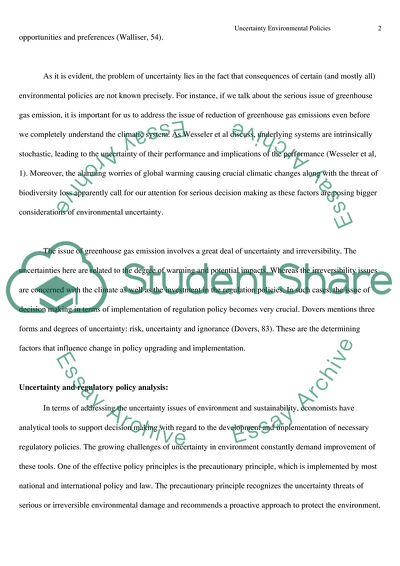
- Home
- Free Samples
- Premium Essays
- Editing Services
- Extra Tools
- Essay Writing Help
- About Us
- Studentshare
- Subjects
- Miscellaneous
- Environmental Economics-Uncertainty environmental policies
Environmental Economics-Uncertainty environmental policies - Essay Example

- Subject: Miscellaneous
- Type: Essay
- Level: Ph.D.
- Pages: 4 (1000 words)
- Downloads: 0
- Author: madisonlehner
Extract of sample "Environmental Economics-Uncertainty environmental policies"
It also looks into the relevance of the uncertainty issue in the analysis of environmental regulatory policies. Contemporary environmental policy and natural resource management face significant challenges posed by the growing concerns of uncertainty. Risk and uncertainty are crucial features of environmental policies that also affect economic systems. As Dovers discusses the issue of uncertainty in environment and sustainability at length, he points out certain common sources of uncertainty (Dovers, 82): Besides, assessment of the natural systems subject to human utilization and management is also important in terms of scientific and policy understanding.
Walliser states that the decision maker can be uncertain about a) the states and their laws, b) the relation linking the uncertainty consequences to the state, and c) his own opportunities and preferences (Walliser, 54). As it is evident, the problem of uncertainty lies in the fact that consequences of certain (and mostly all) environmental policies are not known precisely. For instance, if we talk about the serious issue of greenhouse gas emission, it is important for us to address the issue of reduction of greenhouse gas emissions even before we completely understand the climatic system.
As Wesseler et al discuss, underlying systems are intrinsically stochastic, leading to the uncertainty of their performance and implications of the performance (Wesseler et al, 1). Moreover, the alarming worries of global warming causing crucial climatic changes along with the threat of biodiversity loss apparently call for our attention for serious decision making as these factors are posing bigger considerations of environmental uncertainty. The issue of greenhouse gas emission involves a great deal of uncertainty and irreversibility.
The uncertainties here are related to the
...Download file to see next pages Read MoreCHECK THESE SAMPLES OF Environmental Economics-Uncertainty environmental policies
The External Environment of an Organization: a Management Perspective
Evaluation of how Market-Based Policies deal with Global Environmental Problems
Implementing Policies and Environmental Degradation
Economic Issues Regarding the Environment
Pharmaceutical Industry
A Strategic Environmental Assessment
The Development of Effective Environmental Policies
Sustainability in the Age of Uncertainty

- TERMS & CONDITIONS
- PRIVACY POLICY
- COOKIES POLICY